Part II Measures for Each Priority Issue
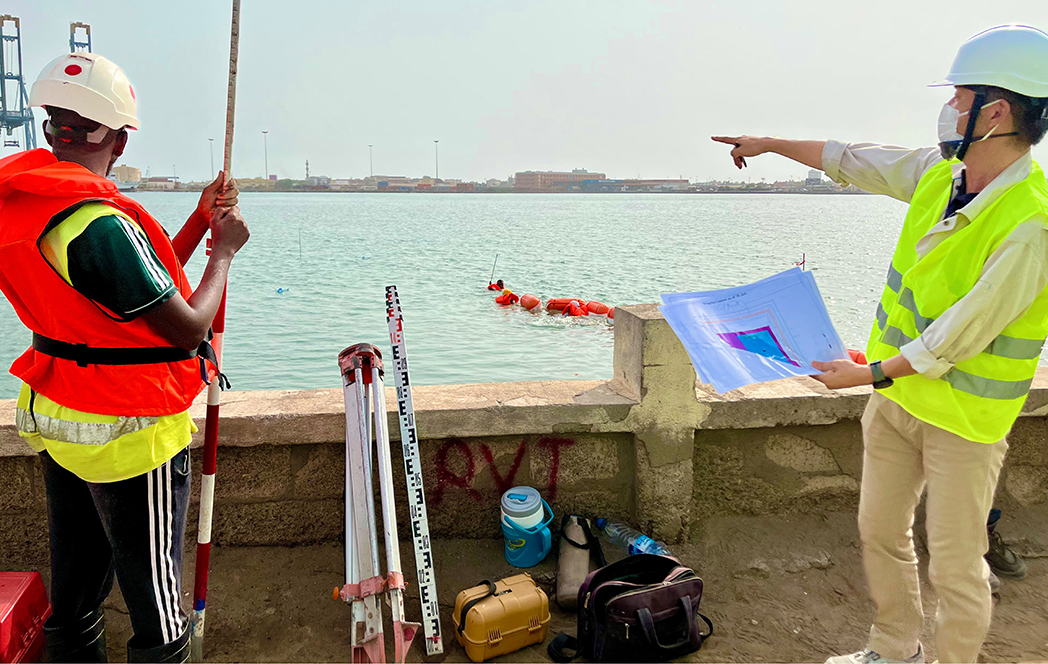
A Japanese engineer giving instructions to local workers at the construction site of the “Project for the Reinforcement of Marine Transport Capacity at the Gulf of Tadjourah,” a grant aid project in Djibouti (Photo: JICA)
1 Cooperation Aimed at Achieving “Quality Growth”
(1) Development of Industrial Infrastructure and Industries and Economic Policy
In order to achieve “quality growth,” Note 1 it is important to improve the socio-economic infrastructure that serves as the foundation for development. Moreover, it is crucial that the private sector plays a key role, and it is indispensable to boost private sector activities, such as the development of industries and the expansion of trade and investment. In developing countries, however, it can sometimes be difficult to develop capacities or set in place an environment for promoting trade and attracting private investment. Thus, support from the international community is required.
● Japan’s Efforts
■ Quality Infrastructure
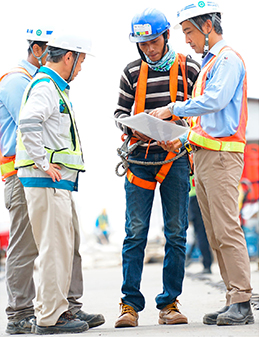
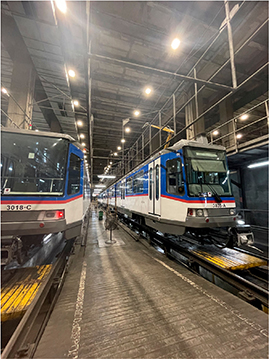
An example of Japan’s cooperation that contributes to the Japan-ASEAN Connectivity Initiative. JICA experts providing technical guidance for the construction of Indonesia’s first subway, the “Jakarta Mass Rapid Transit (MRT) North-South Line” (left photo: JICA), and the train car of the Philippine’s Metro Rail Transit Line 3 (MRT Line 3) overhauled with Japanese assistance (right photo: JICA)
Developing countries continue to have huge demand for infrastructure and the investment gap by 2040 is estimated to be approximately 15 trillion US dollars. Note 2 However, in order to achieve “quality growth” in developing countries, it is necessary not only to develop a large amount of infrastructure, but also to develop “quality infrastructure” Glossary that takes into account openness, transparency, economic efficiency in view of life-cycle cost, and debt sustainability, etc.
Japan develops “quality infrastructure” in line with the economic and development strategies of developing countries and trains human resources to maintain and operate the infrastructure. Japan’s strength lies in helping develop infrastructure that is truly contributory to “quality growth” in developing countries, which also includes technology transfer and job creation.
Japan cooperates with various countries and international organizations to promote and implement the “G20 Principles for Quality Infrastructure Investment,” Note 3 which were endorsed at the G20 Osaka Summit in 2019. The importance of “quality infrastructure investment” has been confirmed at various bilateral and multilateral meetings.
At the Organisation for Economic Co-operation and Development (OECD) Ministerial Council Meeting (MCM) in June 2022, then Parliamentary Vice-Minister for Foreign Affairs Miyake pointed out the importance of creating an environment in which Africa’s growth should not be hindered by opaque and unfair development finance that is not consistent with international rules and standards, and emphasized the significance of implementing the “G20 Principles for Quality Infrastructure Investment.” In the Ministerial Council Statement, the participating ministers and representatives reaffirmed their expectations for the follow-up of the “G20 Principles for Quality Infrastructure Investment,” while taking into account some approaches proposed by OECD member countries such as the Global Gateway strategy Note 4 and the Blue Dot Network certification framework. Note 5
The Partnership for Global Infrastructure and Investment (PGII) Note 6 was launched at the G7 Elmau Summit in June 2022. At the side event on the PGII held during the G20 Bali Summit in November 2022, Prime Minister Kishida stated that Japan is working to improve the investment environment and develop human resources through infrastructure development by introducing concrete examples of quality infrastructure investment. In addition, Prime Minister Kishida stressed the importance of infrastructure development and development finance to be carried out in line with the “G20 Principles for Quality Infrastructure Investment,” adhering to international rules and standards and in a transparent and fair manner. He also stated that the Government of Japan is determined to further promote quality infrastructure investment under the Japanese G7 Presidency in 2023 and to support the self-sustaining growth of each partner country through working with them. In the G20 Bali Leaders’ Declaration, the leaders confirmed their support for the “Compendium of Quality Infrastructure Investment (QII) Indicators” developed for the G20, and expressed their expectation for further discussion on how the QII indicators can be applied.
At the ASEAN-Japan Summit Meeting in November 2020, Japan launched “the Japan-ASEAN Connectivity Initiative” with a focus on quality infrastructure projects worth 2 trillion yen and announced that it would help strengthen land, sea, and air corridor connectivity through infrastructure development together with human resources development of 1,000 individuals in three years. The State Railway of Thailand (SRT) Red Line, with Japan-made rolling stocks, opened in August 2021.
The Government of Japan will continue to disseminate the “G20 Principles for Quality Infrastructure Investment” throughout the international community, and will further work on efforts to implement “quality infrastructure investment” together with countries around the world including Asian countries and international organizations such as the World Bank, the Asian Development Bank (ADB), and OECD.
■ Improving the Trade and Investment Environment
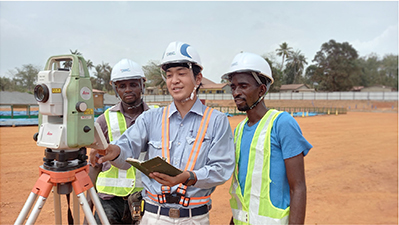
A Japanese expert teaching a survey method at the construction site of the Soumba bridge in Guinea, which is being reconstructed through grant aid (Photo: Dai Nippon Construction)
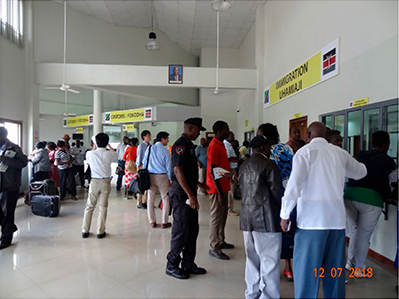
One Stop Border Post (OSBP) facility on the Tanzania-Kenya border developed with assistance from Japan. Immigration control counters at the front, with a customs office in the back, allowing one-stop procedures for leaving Kenya and entering Tanzania. (Photo: JICA)
Japan utilizes ODA and Other Official Flows (OOF) Glossary to support the development of small and medium-sized enterprises (SMEs), the transfer of Japan’s industrial technology, and the formulation of economic policies in developing countries. In addition, Japan supports the development of the trade and investment environment and economic infrastructures in order to enhance the export capabilities and competitiveness of developing countries.
At the Eighth Tokyo International Conference on African Development (TICAD 8) Note 7 held in Tunisia in August 2022, Japan announced initiatives that would promote enhancement in regional connectivity, in addition to social infrastructure development in Africa through the development of quality infrastructure and one-stop border posts at national borders.
With regard to access to the Japanese market, Japan has implemented the Generalized System of Preferences (GSP), which applies tariff rates that are lower than the general tariff to products originating from developing countries. Furthermore, for the Least Developed Countries (LDCs), Glossary Japan applies duty-free, quota-free access Glossary by introducing a special preferential treatment. Through these measures, Japan encourages the import of products from developing countries. Moreover, Japan actively promotes Economic Partnership Agreements (EPAs) Glossary and investment agreements. It is expected that these agreements will promote the facilitation of business environments through liberalization and protection of trade and investment, which will encourage Japanese companies to enter the markets in developing countries, and consequently, contribute to economic growth in developing countries.
Discussions regarding “Aid for Trade (AfT)” Glossary have intensified in various international organizations such as the World Trade Organization (WTO) and OECD, as a means of further promoting support from developed countries, including Japan. Japan has contributed to organizations such as the International Trade Centre (ITC), which implements AfT, with the aim of strengthening the capacity of developing countries to engage in trade negotiations and participate in the global market, and to raise their ability to implement the WTO agreements. In 2022, through ITC, Japan provided assistance to women entrepreneurs in Africa for the utilization of e-commerce, and technical cooperation for expanding vaccine production and distribution in Nigeria.
Japan provides infrastructure support such as funding for the development of transportation networks, including ports, roads, and bridges, as well as for the construction of power generation facilities such as power plants and power grids, all of which are vital for developing countries to engage in trade. Japan also implements technical cooperation in trade-related areas, including the training of customs officials and intellectual property rights experts. For example, in Indonesia, port development and access toll road construction have been underway since 2018 at Patimban Port in West Java Province under the cooperation of Japanese companies with ODA loans and technical cooperation. Public and private sector cooperation has advanced toward improving logistics and other matters. One example is that a full-scale operation of a car terminal has started in December 2021 by a local company invested by Japanese companies (see “Stories from the Field” and “Project Introduction Column 1” for Japan’s infrastructure assistance in South Sudan and Rwanda).
Regarding support for customs, Japan actively provides support mainly in ASEAN member states aimed at improving the capacity of customs through sharing Japan’s expertise and skills in the area. With contributions to the World Customs Organization (WCO), Japan supports capacity building activities that help to facilitate international trade while securing safety through promoting the introduction of international standards adopted by WCO as well as of best practices by various different countries. In addition, Japan dispatches its customs officials as JICA long-term experts to six ASEAN countries Note 8 to provide support tailored to their needs. In Africa, as a JICA-WCO joint project, Japan implements a program (the Master Trainer Programme) to train instructors who will play leading roles in customs administrations in various countries. The program has been expanded to Pacific Island countries since 2021.
Furthermore, Japan provides assistance to small scale production groups and small companies in developing countries over the “One Village, One Product Campaign.” Glossary In addition, to attract private sector investment in developing countries, Japan advances support by identifying unique challenges in those countries and by offering recommendations or advice to local governments.
Promotion of the Sustainable Development Goals (SDGs)
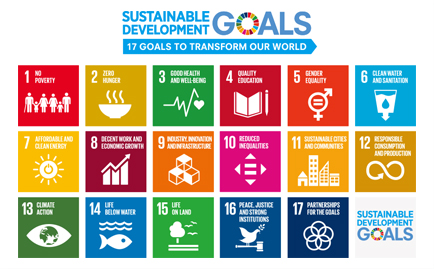
The international community has been confronted with various challenges that cross national borders such as poverty and disparity, terrorism, refugees and displaced persons, infectious diseases, natural disasters, climate change, and environmental issues.
The COVID-19 pandemic and Russia’s aggression against Ukraine have created interrelated and compound risks, such as food and energy security, which hit people in vulnerable situations harder and threaten their human security.
The Sustainable Development Goals (SDGs), Glossary adopted by the UN in September 2015, are the targets for the entire international community to tackle global issues in an integrated manner, including peace, the rule of law, and human rights, leaving no one behind. Japan will work to address and prevent interrelated and compound risks and will contribute to the achievement of the SDGs by the international community.
Achieving the SDGs requires cooperation within the international community beyond the conventional concept of developed and developing countries. It also requires action not only by governments and development agencies, but by all stakeholders, including private companies, local public entities, research institutions, civil society, and individuals. The Government of Japan provides multifaceted support by linking various initiatives using ODA as a catalyst and taking a deep approach so that the entire international community, including developing countries, can achieve the SDGs.
The Government of Japan established the SDGs Promotion Headquarters, with the Prime Minister as its head and all the Cabinet Ministers as its members, and actively works on achieving the SDGs both in Japan and abroad through the formulation of the SDGs Implementation Guiding Principles, which sets the direction for the promotion of the SDGs, and the implementation of the SDGs Action Plan, which compiles specific policies.
■ Support for Mobilization of Domestic Resources
In order to enable developing countries to achieve quality growth by resolving various development issues under their ownership, it is critical that developing countries secure the necessary development funds in the form of tax revenue collection or others with their own capacities. This is known as “domestic resource mobilization,” and its importance has been pointed out in light of insufficient development funding for achieving the SDGs.
Japan, together with the international organizations and other entities concerned, contributes to discussions regarding domestic resource mobilization and provides relevant support to developing countries. For example, Japan proactively provides technical cooperation to developing countries for improving their tax administration. In 2022, National Tax Agency (NTA) personnel served as JICA long-term experts in countries such as Laos, the Philippines, and Viet Nam, in areas including taxpayer management, international taxation, and tax collection. In addition, NTA conducts the International Seminar on Taxation (ISTAX) and training on international taxation for Asian countries for tax officials and others from developing countries. Japan also cooperates with IMF and ADBs in their technical assistance on taxation, including domestic resource mobilization, and provides support in terms of human resources, expertise, and financing, thereby contributing to strengthening capabilities in the field of taxation in developing countries in Asia, and beyond.
In order to support the sustainable development of developing countries, it is also important to implement the OECD/G20 BEPS Project, Glossary which works to prevent aggressive tax planning measures by multinational enterprises. By implementing this project in a coordinated manner with various countries, developing countries will be able to address the tax avoidance of multinational enterprises appropriately and to impose and collect tax properly in their own countries. At the same time, their tax systems and tax administration will be in line with international standards, and a stable, highly predictable, and attractive investment environment will be created for companies and investors. At present, more than 140 countries and regions, including developing countries, are participating in the framework that implements measures recommended under the BEPS Project. Under this framework, a two-pillar solution Note 9 was agreed upon in October 2021 to address the tax challenges arising from economic globalization and digitalization. Work is underway to formulate a multilateral convention and change domestic laws to quickly implement the agreement.
■ Finance
A sound and stable financial system, coupled with smooth financial and capital markets, forms an essential foundation for the sustainable economic development of developing countries. As financial globalization advances, it is pivotal that financial systems in emerging countries are properly established and that assistance is provided for the development of sound financial markets. Based on this concept, the Financial Services Agency of Japan conducted training on financial administration in emerging countries concerning regulatory and supervisory systems and initiatives in Japan’s financial and capital markets. Specifically, “seminars on insurance supervision” were held from January to March, and “seminars on banking supervision” were held from July to November in 2022. Each seminar was held in an on-demand format, Note 10 with a total of 107 participants from seven countries.
Glossary
- Quality Infrastructure
- Infrastructure that genuinely contributes to “quality growth” that is “resilient” against natural disasters and other risks, “inclusive” so that no one is left behind, and “sustainable” taking into account its impact on society and the environment. The “G20 Principles for Quality Infrastructure Investment,” which incorporate key elements for investing in “quality infrastructure” such as (i) openness, (ii) transparency, (iii) economic efficiency in view of life-cycle costs, and (iv) debt sustainability, were endorsed at the G20 Osaka Summit in June 2019.
- Other Official Flows (OOF)
- OOF refers to flows of funds to developing countries from governments, which are not considered as ODA because their main purpose is not development, the leniency of their conditions does not reach the standards, and/or other reasons. Examples include export credit, direct investment by governmental financial institutions, and financing to international organizations.
- Least Developed Countries (LDCs)
- According to the classification by the UN, LDCs are countries particularly behind in development compared to other developing countries based on their income levels. LDCs meet certain criteria, including gross national income (GNI) per capita of 1,018 US dollars or less on average between 2017 and 2019. As of 2022, there are 46 eligible countries: 9 in Asia, 33 in Africa, 1 in Latin America and the Caribbean, and 3 in Oceania.
- Duty-free, quota-free access
- A measure to make products imported from LDCs tariff free and without any import quotas. Japan has been expanding the number of applicable products under this measure, and approximately 98% of all products can be imported under such conditions.
- Economic Partnership Agreement (EPA)
- EPAs are agreements for strengthening a wide range of economic relations, incorporating not only elements of Free Trade Agreements (FTAs) that are aimed at reducing and eliminating tariffs on goods and barriers to trade in services between specific countries and regions, but also elements of cooperation in various sectors such as investment, movement of persons, protection of intellectual property, and rulemaking on competition policy. These agreements are expected to further vitalize trade and investment between countries and accelerate economic growth.
- Aid for Trade (AfT)
- AfT is an assistance provided to developing countries to improve trade-related capabilities and to develop infrastructure for the purpose of achieving economic growth and poverty reduction through trade in developing countries under the WTO’s multilateral trading system. The WTO emphasizes the significance of promoting the development of developing countries through their participation in the multilateral free trading system.
- Sustainable Development Goals (SDGs)
- International goals aimed at a sustainable and better world by 2030, as described in “the 2030 Agenda for Sustainable Development” adopted by all UN member states at the UN Summit in September 2015 as the successor to the Millennium Development Goals (MDGs, 2001). The SDGs consist of 17 goals and 169 targets.
- One Village, One Product Campaign
- The One Village, One Product Campaign is a globally prevailing initiative launched in Oita Prefecture, Japan in 1979. The initiative aims to create jobs and to revitalize local communities through promoting unique products that take advantage of local resources and traditional techniques. In Asia and Africa, this Campaign facilitates expanding exports of developing countries’ products by discovering attractive goods, such as handcrafts, textiles, and toys that represent the unique ethnic characteristics of those countries and by reaching out to a wider range of people.
- OECD/G20 BEPS Project
- Base Erosion and Profit Shifting (BEPS) refers to the issue of multinational enterprises’ aggressive tax planning measures that exploit gaps and loopholes in international tax systems, including tax treaties, in order to intentionally reduce the tax burden for economic activities that should have been taxed. In order to address this issue, the BEPS Project was launched in June 2012 by the OECD’s Committee on Fiscal Affairs, with the aim of ensuring fair competition and making international taxation rules conform with the situation of the global economy and company trends, as well as reviewing international taxation rules across the board in order to raise transparency of governments and global companies.
- Note 1: Growth that is “inclusive” in that the fruits of growth are shared within society as a whole, leaving no one behind, “sustainable” in that it can be sustained while being in harmony with society and the environment, and “resilient” in that it is able to withstand and recover from economic crises, natural disasters, and other shocks (Development Cooperation Charter).
- Note 2: Forecasts by the G20 Global Infrastructure Hub (GIH).
- Note 3: See the glossary “Quality Infrastructure.”
- Note 4: A new strategy announced by the European Commission in December 2021. It aims to increase investments that promote democratic values and high standards, good governance and transparency, equal partnerships, environmental friendliness and reduced burdens, and secure infrastructure, as well as investments that catalyze private sector investment.
- Note 5: A framework for internationally accrediting quality infrastructure projects in developing countries to be established by Japan, the United States, and Australia, with the United States taking the lead since November 2019.
- Note 6: An initiative for the G7 to work together to promote quality infrastructure investment, launched at the G7 Elmau Summit in June 2022. At the summit, the G7 leaders announced their aim to collectively mobilize up to 600 billion US dollars in public and private investment over the next five years, with a particular focus on quality infrastructure.
- Note 7: See “ODA Topics.”
- Note 8: The six countries are: Cambodia, the Philippines, Malaysia, Myanmar, Laos, and Thailand.
- Note 9: Pillar One is a revision of international taxation principles to allow the taxation of global corporations with large scale and high profit levels in market countries regardless of their physical presence. Pillar Two is the introduction of a global minimum tax rate from the perspective of curbing the competition to lower corporate income taxes.
- Note 10: A streaming format in which video training materials that have been filmed and edited in advance are uploaded to a streaming server or other forms of distribution, and participants can take the seminar at anytime they wish.
